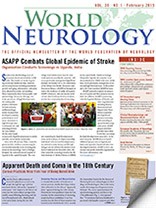Russian meeting’s attendance doubles from previous year
By Vladislav Voitenkov, MD, Ph
A large scientific event was held by the Scientific Research Institute of Children’s Infections of Federal Medical-Biological Agency of Russia this November. Clinical Neurophysiology and Neurorehabilitation 2014 (November 25-26) took place in Mosckovskye Vorota Congress Center in St. Petersburg. This event attracted 330 registered participants. Both the attendance and the scale of the scientific program were significantly larger than that of previous year, which attracted 170 registered delegates. This may highlight the growing interest of the neurophysiologists and neurorehabilitation specialists in the event.
The scientific program was organized around specific themes and methods in neurophysiology and neurorehabilitation, which were covered by the plenary lectures and seven symposia. Plenary lectures included such themes as diagnostic and therapeutic approaches in paraneoplastic syndromes (presented by Prof. W. Grisold, Ludwig Boltzmann Institute for NeuroOncology, Vienna) and the role and place of classic neurophysiologic methods in modern medicine (presented by Prof. V. Gnezditskiy, Scientific Center of Neurology of Russian Academy of Sciences, Moscow).
Themes of the symposia were scientific and clinical aspects of electromyography (EMG), electroencephalography (EEG), diagnostic and therapeutic magnetic brain stimulation (TMS) and evoked potentials (EP), neurorehabilitation techniques in children and adults, neuroorthopedics, clinical aspects of functional state of CNS in children with systemic diseases, neurophysiologic monitoring, and ultrasonography of the brain. Ninety-three speakers presented their data on topics listed above. Symposia included talks from leading Russian and overseas speakers, and presentations from early-career researchers whose material had significant impact in their field.
Speakers for the conference were selected from a wide a geographical spread, with no domination of a single institution in any of the symposia. There were four master-classes: EMG, TMS, micropolarization and taping techniques.
There were 143 abstract submissions from authors from Russia and abroad. The distribution across themes is comparable to the distributions of symposia.
Delegates came from more than 100 locations. About 290 delegates were from Russia, and 40 came from locations outside it: Belorussia, Kazakhstan, Ukraine, Hungary, Austria and Germany. This is the first time that so many of international delegates have attended a conference on this topic in Russia. It should be noted that some of the “local” delegates came from far away parts of the country: Far East (Vladivostok) and Siberia (Irkutsk, Krasnoyarsk, etc).
Feedback from the delegates and speakers about organization of the event was quite positive. The planning process for the next event is underway; we are keen to repeat what was done right, and eager to make it even better. The third conference will take place in St. Petersburg at the end of November 2015.
